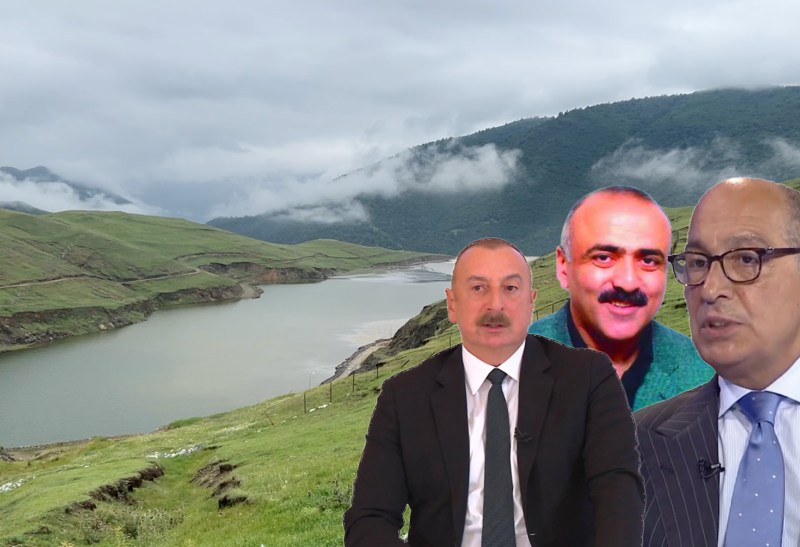Originally published by
iFact.ge
Elnara Hasanova was pulling weeds in the Saatli cotton fields in Azerbaijan. Her daily pay was 10 manat (about $US 5.80). She says she was working about 12-14 hours a day.
In the late afternoon of June 10, the boss told her to move to another field. He didn’t tell her weed killer had been spread between the plants.
“I started feeling dizzy and nauseated,” she remembers. “I passed out. When I woke up, I was in the hospital.”
“Some of them were unconscious, some of them were vomiting, and some were foaming at the mouth,” said Hagigat Mammadova, who was working in an adjacent field where no weed killer was put down that day. “I went to help them until the emergency vehicles came to take them to the hospital.
“Fifteen minutes later, I felt a spasm in my stomach, then nausea and dizziness. I lost consciousness. When I woke up, I was in the hospital connected to a drip. Apparently I was poisoned just from the clothes of the other workers.” She says she still has numbness in one of her arms.
On June 10, about 25 cotton workers were poisoned in fields in Saatli district. On June 19, another 80 workers were poisoned in a cotton field in Imishli region
Nobody died. Some workers were sent to Baku and hospitalized for up to three days. The ones treated in Saatli received liquid drips, shots, and had their bowels evacuated. They were able to return home.
Photos taken at the Saatli fields show canisters of Rifle 48 EC. Its active ingredient is Trifluralin, which is popular with growers because it begins killing weeds upon contact.
Trifluralin has been banned by the European Union since 2008. It is still used in Turkey, the United States and Canada, but should only be handled by workers covered head-to-toe in expensive protective clothing.
Hasanova and other workers were protected only by long sleeve shirts, cloth gloves and scarves to cover their faces. She says they never were warned of potential danger.
Comeback for cotton
For President Ilham Aliyev, the goal was clear.
Azerbaijan produced a million tons of cotton in 1981 when his father Heydar Aliyev was ruling the region for the Soviet Union. Speaking this March 26 at a cotton-growing conference in the western Barda region, Aliyev proudly stated that his father’s cotton legacy was reborn. He said that thanks to his new government program, production had jumped from 35,000 tons in 2015 to 207,000 tons in 2017.
Aliyev did say there were still problems with pesticides used to kill weeds and insects. “The quality was sometimes not at the proper level last year, and this had a very negative impact on yields,” Aliyev told the conference. “There should be very rigorous control over this.
“If we consider that Azerbaijan has already launched local production in this area, I am sure there will be no problems here in the future.”
At least one of the pesticides photographed by iFact.ge on a recent visit to the Imishli fields was an insect killer called Megasun 20 Sp. Its cellophane packaging was clearly labeled: “Gilan Holding” and “Made in Azerbaijan”. The label also warned nobody should be exposed until 24 hours after it was put down, and that contact with skin and eyes must be avoided.
Gilan Holding is a huge conglomerate whose majority owner is a Dubai-registered company called Sahra FZCO. According to a recent Organized Crime and Corruption Report Project (OCCRP) investigation, the true owners of Sahra FZCO are President Aliyev’s daughters Arzu and Leyla.
Gilan Holding dominates the cotton industry in Azerbaijan. Along with large fields and 20 processing plants, Gilan has textile factories in the big cities of Baku, Ganja and Sumgayit.
Poison didn’t kill weeds
The Saatli field in which Hasanova was poisoned was a collective farm during Soviet times and covered about 1,150 hectares. A 1996 decree by then-President Heydar Aliyev ended the collective farm system.
Residents of Saatli were eligible to receive 90 acres per family member. Latif Khalidov was one of those who received land.
“I’ve lost my mind. I don’t know what to say,” Khalidov told an iFact.ge reporter. “The only thing I know is that we didn’t buy this herbicide. We have a contract with MKT Production Commercial LLC. This company provides us with all fertilizers and herbicides. They bring it from the Saatli branch of their company.”
According to Khalidov, MKT collects what he owes for these chemicals at the end of the season when they buy all the cotton he produces. MKT processes the cotton after it has been picked, and sells the final product.
“Cotton is not a high-profit crop,” says one farmer in Saatli who wants to stay anonymous. “We must work only according to state policy. MKT does buy all our cotton, and there is little demand for anything else we would plant.”
The doors at MKT’s Saatli branch were locked when an iFact.ge reporter visited. “There are many choices,” said a company representative. “I don’t know which herbicide was used in that cotton field.
”The Prosecutor’s Office is investigating. They have already taken evidence and arrested our director Chingiz Gozalov. This branch is under the control of the main company. We have nothing to do with it.”
Khalidov said the herbicide came in 5-liter containers. “It didn’t actually kill the weeds,” he said. “If it did, we would never hire and pay so many people to pull the weeds. When we saw it wasn’t working, we had to use manual labor. And now you can see the result. We had no idea that could happen.”
He said he had no information on how long after the weed killer was applied until it was safe for people to begin pulling weeds.
The weed killer was applied 24 hours earlier. It was spread by a man riding a tractor and wearing protective clothes. Then it rained, and after that the workers were sent into the field.
“We are not specialists,” Khalidov said. “We don’t know what kind of herbicide is good or not. The factory (MKT) should know this.”
According to one person who did apply the pesticide in Saatli and wishes to remain anonymous, several poisons were used.
“The herbicide was made in Turkey and “Rifle 48 EC” is printed on the canisters. We found out that the time for using it had expired.
“Actually we use several herbicides. Another one is called “Super Formula”. You can ask about it at the MKT factory. Apparently they bought a lot and now they use up the remains of it.
“I should say that nothing happened to us when we put it down. Probably after a while, when the sun heated the soil, it had some negative impact on it.
“We didn’t touch it with our bare hands. The workers went into the field the next day. Who knows? Maybe they didn’t wear gloves at all.”
“We have only one choice – all the herbicides are produced, sold and imported to our country only via companies connected with Gilan Holding. MKT is also one of these companies. If there was competition, the prices could be cheaper and the quality better. But our contract is with MKT.”
MKT is registered in the same building as Gilan Holding. MKT director Eldeniz Quliyev holds positions in other Gilan Holding companies.
Just drink yogurt
The field in Imishli where 80 were poisoned on June 19 was formerly pasture land. Now 3,813 hectares are farmed by MKT, which improved irrigation and began planting cotton for its own production.
“We started early in the morning, and at 11 we took a break to drink tea. Suddenly we all felt dizzy. Everyone just fell down, one-by-one,” says Matanat Humbatova.
According to Mehpara Asadova, doctors at the hospitals didn’t seem too concerned. “Your health condition is satisfactory. Just drink some yogurt, some buttermilk, and you’ll be fine,” she says doctors told her. Everyone was eventually sent home except one woman, who remained in the hospital for two days.
Asadova said they didn’t know herbicides had been used and that they were working with their bare hands. “We had no special uniform or masks; that’s why we got poisoned so quickly,” she says. “Everyone was screaming, suffering. We almost died because of this state policy.”
The workers say that they saw iron canisters of herbicides when they came to the field. Asadova said there were also cellophane wrappers with “Gilan Holding” printed on them.
An iFact.ge reporter saw cellophane wrappers for the herbicide Megasun 20 Sp stating that it was produced in Azerbaijan for Gilan Holding. According to the warning on the cellophane, workers should not be exposed for 24 hours after it is put down, and there should be no contact with skin or eyes. But the workers were using bare hands and only wrapping their face with a scarf.
An anonymous employee who works in the Imishli Cotton Factory where the raw cotton is processed says that all the herbicides used in these fields are produced in Azerbaijan, mostly in Sumgayit.
“There were two main reasons for the poisoning,” he said. “Some herbicides had expired. And the people who used it were not specialists. There are instructions that should be followed. In some fields the tractor drivers just mix it in water and splash it on the ground.
”The company branch director has been arrested, but it’s not his fault. He swears that he didn’t get any new herbicides at the market; it was all left over from last year. If they tell him to use it, who is he is disagree?”
On June 20, the head of the State Phytosanitary Control Service of the Ministry of Agriculture Jamal Guliyev was dismissed.
According to Eldar Sultanov, chief of Press Service of the Prosecutor’s General Office, the investigation continues. “The companies that are involved in cotton production, their agronomists and other responsible persons did not follow the instructions of the herbiciding process. The workers were not given proper instructions. They were brought into the field (too soon).”
In the meantime, 28 of the women who were poisoned in Imishli have returned to work. They told an iFact.ge reporter they need the money.



